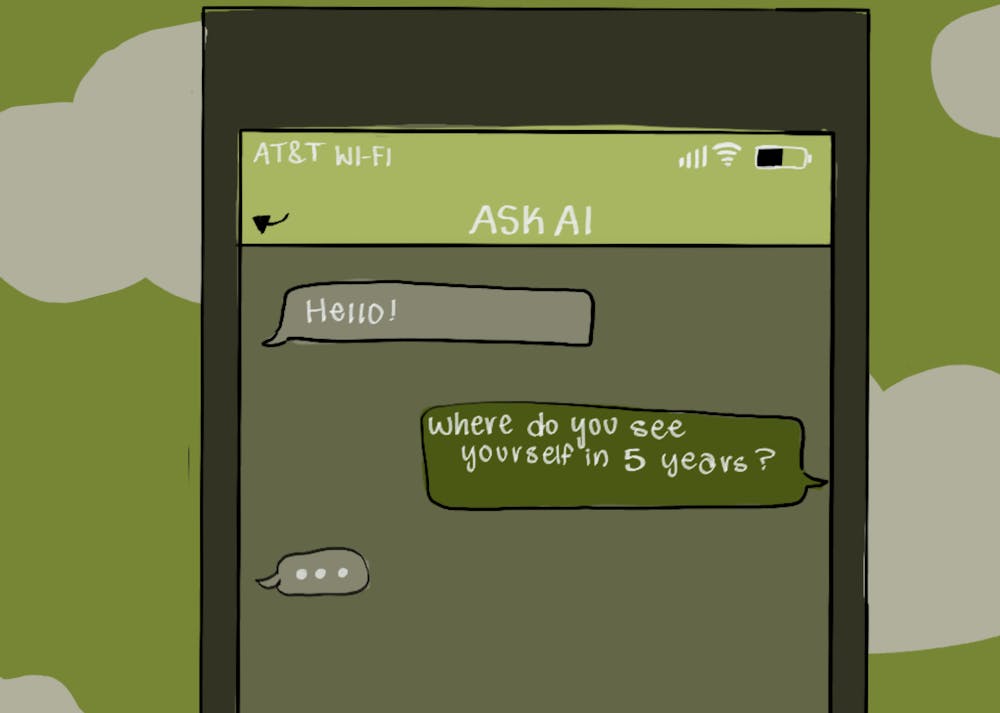Recently, the use of artificial intelligence systems such as ChatGPT and Midjourney has skyrocketed. Since many ASU students selected and started their degree programs before this significant rise in technology, they are left to ponder the implications of AI’s potential future impact on their chosen fields.
While the rise in artificial intelligence is a threat to some fields, many still require a human touch which is why ASU students in certain fields shouldn't worry about their job prospects being negatively impacted by AI following graduation and instead should use it as a helpful tool.
In 2021, Knight Foundation announced a new $3 million initiative to help news stations use AI to their benefit. The top use of AI in these projects was augmenting reporting capacity, where AI took on the responsibility of combing together data and finding breaking news. In this case, AI makes the reporting process quicker, but much of the actual writing and fact-checking still falls on journalists.
The content-creating process, as it stands now, is more effective when humans are doing the creation. AI can aid people in content development but is not yet at the level where it can create and publish content without some sort of human interference for clarity or fact-checking.
"I would still choose journalism as my major, even if AI was a factor. It's something I love doing, and human passion beats something created by a machine any day," said Kia Brown, a freshman studying journalism.
As for myself, I chose my medical studies major in early 2022. ChatGPT was released in late November 2022. Had this technology been around when I applied to ASU, would I have decided to pursue another major? I doubt it.
As a pre-medical student, I am fairly confident that AI will not get rid of my job prospects any time soon. There has not yet been an invention that has led to the decimation of a particular medical specialty, and the overwhelming majority of specialties require frequent patient interaction.
If we don't become incredibly overzealous with our desire to replace ourselves with AI, it will never take our place in delivering face-to-face care.
"I think AI will definitely impact the medical field simply because AI is becoming a very prominent feature in almost all professional pathways," said Sindhu Jayamani, a freshman studying medical studies." However, I believe that regardless of what AI is developed in the medical field, the most reliable caregiver would not be an AI."
"Some slip-ups by the AI, if it is perhaps performing a surgical procedure, cannot be foreseen. If it is not prepared to deal with them, lives could be lost," Jayamani said.
Other non-AI technologies, such as the da Vinci Surgical System, have become increasingly prevalent in hospitals across the nation. Famous for doing surgery on a grape, the robot was simply being controlled by a surgeon. In this regard, I find the use of technology to be a positive force, assisting skilled workers rather than stealing their job.
Despite the security of some fields, it is important to take into consideration that the automation of just a handful of other fields could have negative effects on everyone. At the end of the day, humans must look out for humans rather than technology.
For example, AI is creeping into many non-degree-required fields. Truck driving is a field that is increasingly being impacted by the rise of AI.
According to the McKinsey Center for Future Mobility, autonomous trucks will be implemented in four phases. The last phase, which will result in the complete automation of truck driving, is expected to roll out within the next decade.
According to the US Census, there are over 3.5 million truck drivers in the United States. The Phoenix metropolitan area has one of the highest levels of employment for truck drivers in the country, with almost 29,000 truckers being employed.
This means that within the next decade, 3.5 million people, including almost 29,000 drivers located right in Sun Devil territory, could potentially be forced out of their current field of work. This possibility has huge implications for the economy, transportation and unemployment rate.
We are at a major turning point in the history of technology. 120 years ago, we flew the first plane. Over 50 years ago, we landed on the moon. And just 16 years ago, the first iPhone was released. Now, we have come so far in our quest to advance that we are inventing technology that has the potential to overpower its creators.
The current state of AI doesn't pose a huge threat to all professional fields. In many cases, it can be a helpful tool. While AI becomes more advanced, though, we should still make sure to put people first and tread carefully.
The advancement of AI is a new, exciting possibility, but we cannot afford to get too far ahead of ourselves. We created the world around us. It is important that we remember to save room for ourselves, no matter how impressive our creations are.
Edited by Kate Duffy, Jasmine Kabiri and Grace Copperthite.
Reach the columnist at sgkrantz@asu.edu and follow @selma_krantz on Twitter.
Editor's note: The opinions presented in this column are the author's and do not imply any endorsement from The State Press or its editors.
Want to join the conversation? Send an email to opiniondesk.statepress@gmail.com. Keep letters under 500 words and be sure to include your university affiliation. Anonymity will not be granted.
Like The State Press on Facebook and follow @statepress on Twitter.




